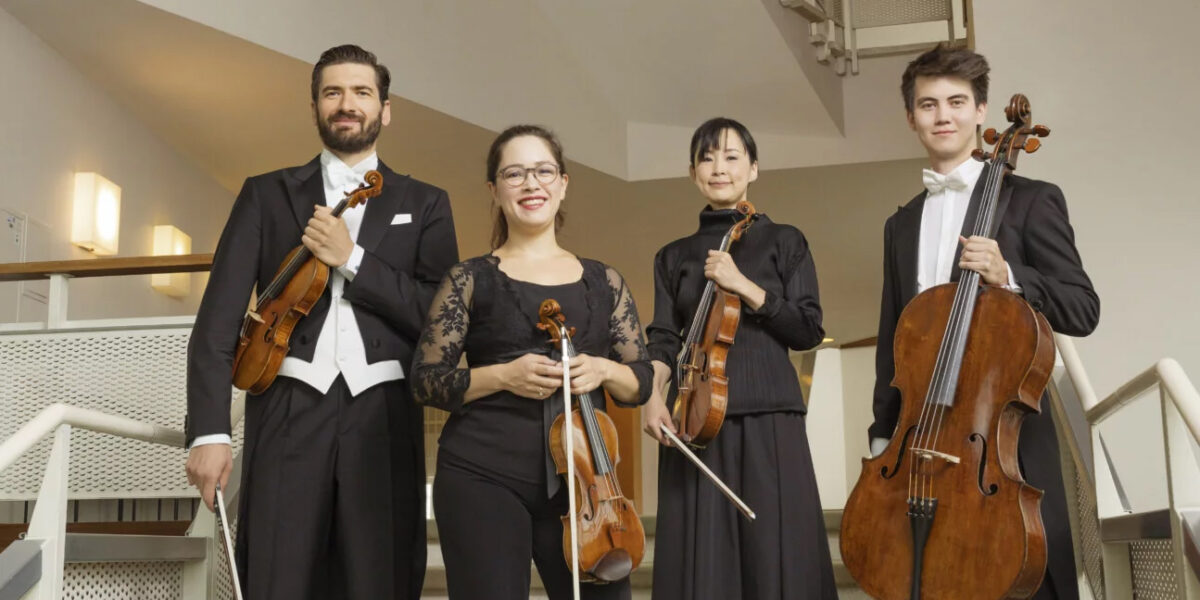The Philharmonic String Quartet represents chamber musical excellence of the Berlin Philharmonic: cosmopolitan, versatile and artistically passionate. The Quartet was founded in 2018, and features three members of the Berlin Philharmonic – Dorian Xhoxhi (violin), Helena Berg (violin) and Naoko Shimizu (viola) — and the esteemed soloist Christoph Heesch (cello). The balance between powerful freshness and rich, philharmonic sound particularly distinguishes this ensemble. “The Philharmonic String Quartet captivates the audience from the first note.” (Rondo Magazine 5/14/2022)
The musicians are aware that they are following in great footsteps: with the Philharmonic String Quartet they are continuing the venerable tradition of the Berlin Philharmonic’s ensembles of making chamber music at the highest level. All four musicians have won various top-class competitions and have vast experience in various chamber music formations. The Philharmonic String Quartet offers them the opportunity to create their own musical expression. They feel less committed to a certain style than to their virtuosity, and they follow the motto of Wolfgang Amadeus Mozart: “… because we love to talk to all kinds of masters – with the old and modern.”
Helena Berg (violin)
The violin plays an important role in her family: her parents are violinists, and after her big sister started getting lessons from them, Helena Madoka Berg did not want to be left behind. The desire to become a professional musician however came later. Born and raised in Berlin, she studied at the Julius Stern Institute of the Berlin University of the Arts (UdK) with Tomasz Tomaszewski (1997-2004), at the Juilliard School New York with Robert Mann, and at the Hanns Eisler University of Music with Antje Weithaas. She also attended master classes with Kurt Saßmannshaus, Thomas Brandis, Rainer Kussmaul and Christian Tetzlaff among others. Her training was supported by several grants, including the Deutsche Stiftung Musikleben and the Villa Musica Rheinland-Pfalz.
The winner of various competitions, such as the Jakob Stainer Violin Competition and the Ibolyka Gyarfas Violin Competition, she gained her first orchestral experience in the Jeunesses Musicales World Orchestra, the Berlin State Youth Orchestra, and the Gustav Mahler Youth Orchestra. From 2009-2010 she apprenticed in the Berlin Philharmonic Orchestra Academy studying under Guy
Braunstein and Christian Stadelmann. Her first orchestral position led her to the Munich Philharmonic, and since 2012 she has been a member of the Bayreuth Festival Orchestra. In September 2013 Helena Madoka Berg returned to the Berlin Philharmonic as a member of the second violins, and in February 2016 joined the first violins. Aside from her love for making music, she keeps busy with her two small children.
Dorian Xhoxhi (violin)
Violinist Dorian Xhoxhi joined the Berliner Philharmoniker as a member of the first violin section in 2010. Before that, he was a member of the Deutsches Symphonie Orchester Berlin and later became Principal Concertmaster of the Second Violins in the Gewandhausorchester Leipzig.
At the age of six, Dorian received his first violin lessons from his father, university professor Roland Xhoxhi, in Tirana. He later studied in Munich and Berlin with Prof. E. Sebestyen, Prof. S. Picard and Prof. A. Weithaas. Through achieving a fellowship at the Villa Musica Mainz and attending master classes from Midori, R. Fein, Z. Bron and E. Feltz, Dorian received further crucial impulses. In 2006 he was awarded first prize at both the International Queen Sophie Charlotte Competition in Mirow und the International Louise Henriette Competition in Oranienburg.
As a member of the Berliner Barock Solisten, Dorian frequently works with artist personalities such as Reinhard Goebel, Emmanuelle Haim and Vittorio Ghielmi. In this context, the performance with period instruments has developed into an integral part of Dorian’s artistic work throughout several years.
A demanded soloist, chamber musician and teacher, Dorian is regularly active in Europe and Asia. In 2018, he became an associate professor for violin at the Rostock University of Music and Drama.
In the same year, his enthusiasm for chamber music led Dorian to establish the Philharmonic String Quartet with his Philharmonic colleagues Helena Madoka Berg and Kyoungmin Park. Dorian plays a violin from Camillo Camilli, Mantova 1739.
Naoko Shimizu (viola)
In 1997, Ms. Shimizu won 1st Prize at the ARD International Music Competition in Munich, becoming the first violist in 21 years to win this prize. She has been a welcome guest at international concert venues ever since. Prior to that, she won the International Competition in Geneva in 1996 as well as winning 1st Prize at the International Instrumental Competition in Markneukirchen, Germany in 1995. In 1998, she won the Young Concert Artist International Auditions in the United States.
Ms. Shimizu has performed as a soloist with such orchestras as the Symphonieorchester des Bayerischen Rundfunks, the SWR Radio-Sinfonieorchester Stuttgart, the Orchestre de la Suisse Romande, the Budapest Strings at the Rheingau Musik Festival, as well as with many Japanese orchestras. She has also appeared in recital on solo concert tours of the US, Italy and Japan. She was a guest chamber music artist with the Malboro Music Festival in the US from 1995 to 1998. She also took part in the “Musicians from Marlboro Tour“.
Born in Osaka, Japan, Naoko Shimizu studied viola under Nobuo Okada at the Toho Gakuen School of Music, Japan. In 1994, she began studies with Nobuko Imai at the Hochschule für Musik in Detmold, Germany, completing her degree in viola performance there. She has been the principal violist of the Berliner Philharmoniker since 2001, as well as being in high demand as a soloist and chamber musician.
Christoph Heesch (cello)
Christoph Heesch is one of the most promising artists of today’s music scene and impresses with his soloistic and chamber music skills — meanwhile he is celebrating great success both nationally and internationally. The main focus of his artistic work is the examination of music from a stylistically critical perspective, taking into account the technical skills of instrumental playing combined with an exciting interaction with the audience.
Born in Berlin in 1995, the artist began playing the cello at the age of six. In the following years he studied at the Julius Stern Institute, worked for several years with Jens Peter Maintz and attended master classes with David Geringas, Wolfgang Boettcher and Lászlo Fenyö. Today Christoph Heesch studies at the University of the Arts Berlin with Wolfgang Emanuel Schmidt. As solo cellist of the Ensemble Esperanza and the Chamber Orchestra Eroica Berlin he combines knowledge of historically informed performance practice with modern instru- ments.
The artist pays particular attention to classical concerts, which he would like to open up to a broad audience. The innovative concerts and other music mediation formats of the TONALi project offer an ideal home for his musical and conceptual ideas.
Christoph Heesch is a laureate of national and international competitions: He was awarded at the “Antonio Janigro” competition in Croatia and the international “Witold-Lutosławski” com- petition as well as at the XIIth Domenico Gabrielli Competition. Christoph Heesch has also been awarded the “Mieczysław Weinberg” prize and a special prize for the best music medi- ation at the TONALi15 music competition. At the German Music Competition 2016 in Bonn he received a scholarship after reaching the semifinal and he was semifinalist of the Queen Elisa- beth Competition 2017.
He holds a scholarship at the Musikakademie Liechtenstein and has been playing a cello by Domenicus Montagnana from the German Musical Instrument Fund „Deutsche Stiftung Mu- sikleben“ since 2017.


